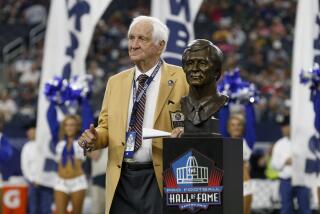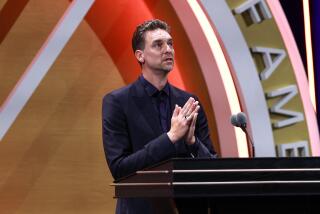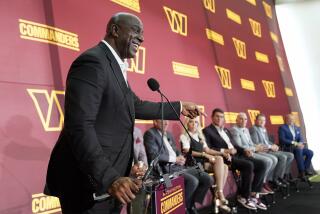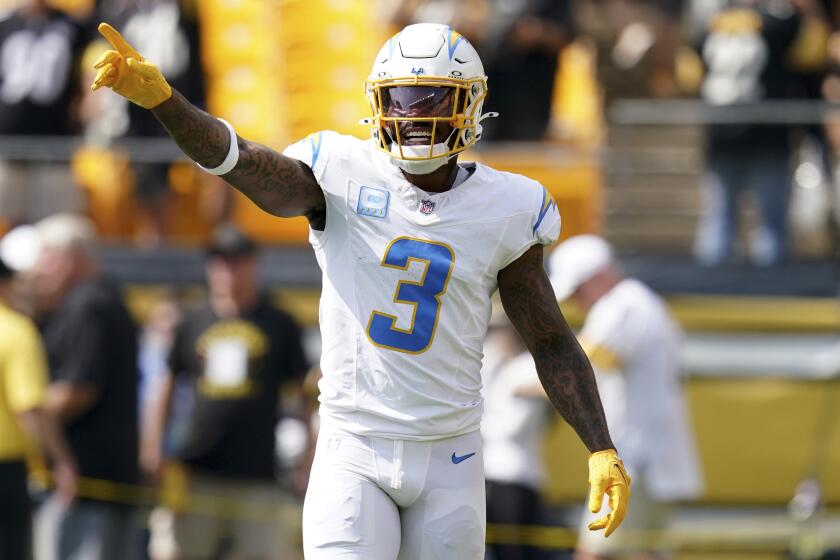20 years later, trade still echoes
IRVING, TEXAS â Jimmy Johnson has a challenge for anyone who believes the Herschel Walker trade single-handedly turned the Dallas Cowboys into the dominant team of the 1990s.
âTrace it,â the former Cowboys coach said. âYou canât do it.â
Twenty years ago Monday, the Cowboys sent Walker to the Minnesota Vikings for a bundle of players and draft picks in what is widely considered one of the biggest steals in NFL history, if not all of pro sports.
The legend has grown because Dallas went from 1-15 to three-time Super Bowl champions in just a few years. Sure there was a lot more to the turnaround, but thereâs no doubt this deal was the catalyst.
âIt was a once-in-a-lifetime thing,â said Charley Casserly, then the general manager of the Redskins.
But this trade wasnât just a big-time swindle.
The strange truth is that the Cowboys didnât use a single one of the Vikingsâ picks -- except to parlay them into more or higher picks.
Johnson made 51 trades in his five years in Dallas, âmore than the entire league put together,â he proudly noted. Thatâs how the Cowboys built the crux of their championship rosters. Emmitt Smith came on a pick from Pittsburgh, Darren Woodson and Russell Maryland on picks from New England, Dixon Edwards and Clayton Holmes on picks from Washington, Kevin Smith on a pick from Atlanta, and Godfrey Myles on a pick from San Diego.
See why tracing the trade is nearly impossible?
And it explains why so many teams now go into the draft looking to move up, down or both. The Cowboys didnât invent the concept, but they sure helped make it popular.
This trade changed a lot of things for a lot of people the last two decades, all because some NFL newcomers were willing to do things differently and they wound up doing it better than it had ever been done before.
Jones vs. Landry
October 1989 was a weird time for the Cowboys and Vikings.
In Dallas, Arkansas oil man Jerry Jones had bought the Cowboys that February, fired Tom Landry and hired Johnson, a successful college coach with no pro experience but whoâd been his college teammate at Arkansas.
They took Troy Aikman with the first overall pick in the draft, then hedged their bets by using a supplemental pick on Steve Walsh, whoâd helped Johnson win a national championship at Miami. That move cost Dallas its first-round pick in 1990 and triggered a quarterback controversy.
Aikman started the opener, went 0-4 and broke a finger. Walshâs first start happened to be the Cowboysâ first game at Lambeau Field since the Ice Bowl in 1967. With Walker joining him in the backfield, Dallas lost again.
The Vikings, meanwhile, were trying to regain the optimism they had at the start of the season -- before they lost two games, their quarterback broke a hand and their All-Pro safety accused general manager Mike Lynn of being a racist.
Both teams needed to do something. Something drastic.
Walkerâs best season
Johnson and Lynn had talked about a trade during training camp. For Walsh.
âI might be interested in that Herschel Walker guy,â the Minnesota GM said.
âNo,â Johnson said. âThatâs the only Pro Bowl player that weâve got.â
Once Johnson realized how terrible his team was, he was ready to trade his only Pro Bowl player. Walker was 27, coming off his best season and still had a year left on his contract.
Johnson wanted three first-round picks, three second-rounders and three thirds. He almost had a deal with the Browns, but they lacked a first-rounder in â90, so the Cowboys kept shopping.
Lynn swooped in with an intriguing proposition: Five players, each with a first-, second- or third-round pick attached. The Cowboys could enjoy the talent upgrade for the rest of the season, then take either the player or the attached pick.
Johnson finagled an extra first-rounder. All along, he planned to keep both the players he liked and the picks.
âThatâs why at the press conference I said, âThis is a great train robbery,â â he said recently. âEverybody looked at me like I was a complete fool, including Jerry, because they werenât sure we could pull this thing off.â
Johnson limited the playing time of the ex-Vikings to keep coaches and fans from getting too attached. After the season, he told Lynn the Cowboys wanted a few of the players, but was cutting them all anyway. Lynn hung up.
It took a certified letter sent to the league office, with a copy to the Vikings, for Lynn to call back and work things out. Johnson gave him some other picks, which is how the trade grew to 18 players and picks, still the largest in league history.
âWhen we heard about the Herschel Walker trade, we were like, âWait a minute? Are we sure this is right? Is it true?â â said Casserly, now an analyst for CBS Sports. âWe knew right then it was a hell of a bonanza.â
A parting gift
Walker didnât want to go, but didnât have a no-trade clause. Fearing that Walker could mess everything up, Jones gave him a $1.25 million going-away gift, essentially paying his best player to leave.
Walker dazzled in his Minnesota debut. Lynn was happiest of all.
âWe felt that the last piece of the puzzle, the last spoke on the wheel, was a running back -- and not just a running back, but a marquee running back,â he said at the time. âIf we donât get to the Super Bowl while Herschel Walker is a member of the Minnesota Vikings, then we have not made a good trade.â
Uh, no, they didnât.
The Vikings made the playoffs in â89, lost right away, and didnât make it back in 1990 or â91. Walker was cut the following summer; by then, Lynn had resigned and coach Jerry Burns retired.
âHerschel was basically an I-back and we were a two-back, sweeping, trapping team,â Burns said this week. âHe made every accommodation. On at least two or three occasions, he told me heâd cover kickoffs or punts. Things just didnât work out real well. ... You know how it is in pro football, your team reaches a peak then levels off and goes down the tubes.â
Bonanza of picks
The Cowboys werenât the first to use draft-day maneuvers to fortify their roster with young talent and lots of it. The model was right in front of everyone.
San Francisco was coming off a Super Bowl title in 1988 and was headed to another in â89. What put them over the top was their 1986 draft, when Bill Walsh kept trading down until he had 14 picks. He selected eight future starters, including Charles Haley, John Taylor and Tom Rathman.
Dallas dabbled with a similar strategy in 1989, then the Walker trade changed everything for years to come. Whatever move they made, they had the luxury of knowing that if it didnât pan out, they had the firepower to do something else.
âIâve had times in my life when I wouldnât take risks because if I lost, I wouldâve busted,â Jones said. âWhen you have the dynamic of a pocket full of picks, you can gamble. ... As much as the picks themselves brought us players, that attitude of risk-taking made a big difference in how we built the team.â
It also helped that they picked wisely, which wasnât the case with other teams that gave up running backs in blockbuster trades.
The Rams dealt Eric Dickerson for three first-rounders and three second-rounders over the â88 and â89 drafts. They used all six and had a losing record every year from 1990-98.
In 1999, Casserly and the Redskins sent the right to draft Ricky Williams to New Orleans for six picks that year, plus first- and third-rounders the following year. Washington made the playoffs in â99, then didnât have a winning record for five straight years.
The fallout
Dallas went 1-15 in 1989, then soon launched the greatest four-year run in NFL history, winning the Super Bowl in 1992, â93 and â95, and reaching the NFC championship game in â94.
That surge from the bottom of the bottom to the top of the top makes their run even more amazing. Itâs also why the Walker trade is so inflated -- well, by everyone except Johnson.
Earlier this year, Aikman asked Johnson whether the Cowboys wouldâve won the Super Bowl without making that deal.
âYeah,â Johnson told him, âbecause if we hadnât made the Herschel Walker trade weâd have done something else. We might not have gotten good as fast as we did, but we wouldâve eventually been there.â
More to Read
Go beyond the scoreboard
Get the latest on L.A.'s teams in the daily Sports Report newsletter.
You may occasionally receive promotional content from the Los Angeles Times.










